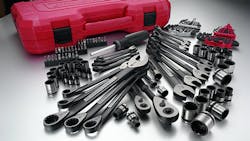New Plant May Follow Stanley Black & Decker, Craftsman Deal
Stanley Black & Decker Inc. reportedly will build a new manufacturing plant in the U.S., a $35-million capital investment, in a bid to support the “Buy American” industrial and trade policies advocated by President-elect Donald J. Trump. Details of the new plant development — such its location, schedule for development, and the products to be manufactured there — are unknown.
It’s also unclear whether the stated value of the investment represents a total cost, or an initial development cost.
The news of the capital investment was referenced but not elaborated in the announcement that the Connecticut-based manufacturer of industrial tools, household hardware, security products, and locks, has agreed to buy Sears Holdings’ Craftsman brand in a complex deal valued at up to $900 million.
"We intend to invest in the brand and rapidly increase sales through these new channels, including retail, industrial, mobile, and online,” Stanley Black & Decker CEO James Loree stated. “To accommodate the future growth of Craftsman, we intend to expand our manufacturing footprint in the U.S. This will add jobs in the U.S., where we have increased our manufacturing headcount by 40% in the past three years.
Craftsman is a line of hand tools, power tools, and lawn and garden equipment produced for Sears by a number of manufacturers, some domestic operations as well as some offshore suppliers.
The acquisition will draw some scrutiny from the Federal Trade Commission because it calls for Stanley Black & Decker to lease the Craftsman brand back to Sears under a perpetual license, meaning the two different versions of Craftsman products will compete against each other: Sears will sell its line only in its stores: whereas Stanley will sell Craftsman brand products through other, non-Sears outlets (e.g., Ace Hardware, Home Depot, Lowe's and other hardware chains.)
What is significant about the deal is that Sears currently contracts with Asian and other manufacturers to produce the Craftsman products, but Stanley plans to produce its version the U.S.
According to reports, Loree informed the President-elect of the plans to build the U.S. plant, and Trump’s spokesman Sean Spicer quoted Loree saying the company plans to “‘make where we sell because President-elect Trump's policies make it advisable to have more manufacturing in the U.S.’”
Spicer commented that the incoming administration’s “leadership” and “policies” would benefit American workers and make the United States “the world's great magnet for innovation and job creation.”
Stanley Black & Decker was formed in 2009 when The Stanley Works purchased The Black & Decker Corp. in an all-stock, $4.5-billion transaction. Stanley supplied tools for industrial, construction, and do-it-yourself use; and Black & Decker manufactured power tools and accessories, hardware and home improvement products, and technology-based fastening systems. The combined organization is the largest U.S. toolmaker, with numerous brands including Baldwin, Black & Decker, Bostitch, DeWalt, Mac Tools, Stanley Hand Tools, and many more in the construction and DIY tools sector, power tools, industrial tools, fastening technologies, infrastructure tools and technologies, and security systems.
The Craftsman acquisition is expected to close during 2017, according to the two parties’ announcement.
About the Author
Robert Brooks
Editor/Content Director - Endeavor Business Media
Robert Brooks has been a business-to-business reporter, writer, editor, and columnist for more than 20 years, specializing in the primary metal and basic manufacturing industries. His work has covered a wide range of topics including process technology, resource development, material selection, product design, workforce development, and industrial market strategies, among others.
Currently, he specializes in subjects related to metal component and product design, development, and manufacturing—including castings, forgings, machined parts, and fabrications.
Brooks is a graduate of Kenyon College (B.A. English, Political Science) and Emory University (M.A. English.)

